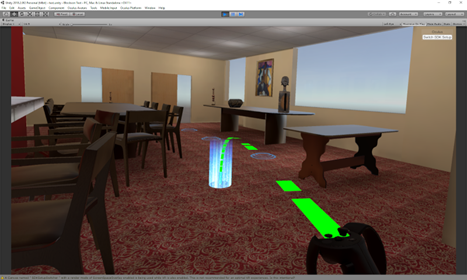By Hyangeun Ji
The potential of Virtual Reality (VR) to bring historical spaces to life and foster historical empathy in social studies classrooms is a tantalizing concept. However, there is a notable scarcity of empirical research to support these pedagogical approaches. This is where our exciting project to expand teaching with VR comes into play.
In previous blog posts, Jasmine Clark shared her collaborative work with Alex Wermer-Colan and Jordan Hample, detailing her initial explorations of VR for teaching on the Virtual Blockson project, including findings that serve as a springboard for our current direction. The Virtual Blockson is a project that utilizes virtual reality VR to teach high school students primary source literacy using materials from the Charles L. Blockson Afro-American Collection. As a Graduate Student Extern at the Scholars Studio, I joined the expansive research phase of the project with Timothy Patterson that aims to develop, test, and research a VR game centered around the Blockson Collection at Temple University. With a recently funded grant from the Getty Foundation, we are embarking on a journey to explore the impact of VR on historical learning, particularly focusing on African-American history in Philadelphia.
Audience and Impact
Our VR game is designed for a wide audience, including the general public and secondary students, particularly those in Philadelphia. Like many urban school districts, Philadelphia has a majority Black student body and a mandated 10th-grade African American studies course. The Virtual Blockson offers a much-needed resource. We are collaborating with a curricular coordinator for social studies in Philadelphia to align our game with the curriculum framework.
Studying Virtual Reality in the Classroom
Our project builds upon the ongoing efforts to incorporate immersive VR technologies and computer-based games into the classroom. Previous research has shown that digital simulations and games can positively impact users’ engagement and presence in learning (Ke et al., 2016). Early insights also indicate that VR can significantly impact students’ empathy in learning history (Patterson et al., 2023).
In this new era of educational innovation, teachers are exploring various strategies to integrate VR into their teaching methods (Patterson and Han, 2019), thereby transforming the conventional approach to education. Our ultimate goal is to develop a comprehensive teacher toolkit for VR in history education, informed by our research findings.
Our research is anchored in the co-design method, which ensures a collaborative and iterative design process, addressing specific educational needs. We are bringing together a unique blend of teachers, researchers, and developers to conceptually and practically shape VR-based educational tools.
A crucial aspect of our research involves working closely with teachers. They are not just participants but essential partners, providing insights that ensure our VR solutions are not only innovative but also practical and aligned with curricular needs. This collaboration is vital as we explore new pedagogical strategies for integrating VR into history classrooms.
Research Aims
We’re engaging secondary social studies teachers and their students from the School District of Philadelphia in our study. Through focus groups, gameplay sessions at the Loretta C. Duckworth Scholars Studio, and thorough feedback processes, we aim to capture a holistic view of VR’s role in history education.
- For Students
Our primary goal for students is to cultivate historical empathy and primary source literacy skills in an immersive learning environment that captivates and facilitates their exploration of historical archives. This immersion will enhance their knowledge of archival research and develop their historical empathy. Through our VR experience, we aim to deepen their connection to Philadelphia’s African-American history, fostering a sense of empathy for the people and events that shaped the past.
- For Teachers
Our project’s focus for teachers is to gauge the feasibility of integrating VR into their history instruction. We aim to understand their perceptions and practical considerations when adopting VR as an educational tool. We also aim to explore the strategies employed by teachers to prepare students, engage them during the VR experience, and evaluate related learning outcomes. These insights will help refine our teacher toolkit and inform best practices for VR-based history instruction. The toolkit will include resources to facilitate seamless integration into the curriculum, ensuring ease of access, and offering writing prompts to assess student learning within the game.
Next Steps
In the near term, we will focus on user testing with teachers and students. This will involve conducting focus groups with teachers and interviews with students, alongside employing think-aloud protocols to gain deeper insights into their experiences and perceptions. The feedback collected will be instrumental in refining our VR game.
Looking further ahead, our future work involves developing and optimizing the teacher toolkit, designed to be an essential resource for educators integrating VR into history education. This toolkit will encompass a step-by-step guide for accessing the VR game, best practices for classroom use, and brief instructional videos for quick reference. It will also include comprehensive curriculum integration resources, such as lesson plans aligned with the African American Studies curriculum guide, readings for background knowledge, and writing assignments, all tailored to facilitate archival research and historical thinking.
Our goal is to create a toolkit that not only simplifies the adoption of VR technology but also enriches the teaching and learning of history.
References
Ke, F., Xie, K., & Xie, Y. (2016). Game‐based learning engagement: A theory‐and data‐driven exploration. British Journal of Educational Technology, 47(6), 1183-1201.
Patterson, T., & Han, I. (2019). Learning to teach with virtual reality: Lessons from one elementary teacher. TechTrends, 63(4), 463-469.
Patterson, T., Han, I., & Esposito, L. (2022). Virtual reality for the promotion of historical empathy: A mixed-methods analysis. Theory & Research in Social Education, 50(4), 553-580.
